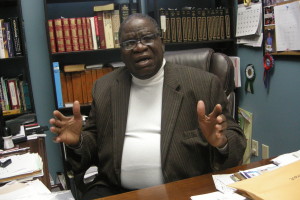Fundamental problems in the life of Faith

By Bishop Jacob Afolabi
Hebrews 6:1,2 “Therefore leaving the principles of the doctrine of Christ, let us go on unto perfection; not laying again the foundation of repentance from dead works, and of faith toward God, Of the doctrine of baptisms, and of laying on of hands, and of resurrection of the dead, and of eternal judgment.”
There are some fundamental problems that confront natural life at its very beginning. Problems such as its continuation or sustenance; its protection from prevailing dangers; the problems of its growth; the issues of its fruit-bearing; and finally the question of the end of its existence.
Similar problems also confront the life of faith. But the Holy Scriptures has given answers to these and all other questions. Let us now examine them in detail.
When we become saved in the Lord Jesus Christ, we enter into a new life that is broad in its content but mysterious in its form. There are many questions as to “what kind of life is this that l have entered into?” Without a keen understanding of what it means to be a Christian, or a follower of Christ (Matt.9:9), disappointment may soon succeed faith, and the hope that is raised may be wounded and maimed for good. To avoid this unwelcome tragedy, let us now study what is known as the “The Principles Of The Doctrine of Christ.”
It is written thus, “Therefore if any man be in Christ, he is a new creature: old things are passed away; behold, all things are become new.” (2Cor.5:17). When we enter into Christ we assume a new life of existence with a new nature of being. Though we still retain the genetic structure of Adam’s physical make-up, we are essentially new, now resembling and responding to a new nature, the nature of Christ. We take on the nature of the one who freed us from the bondage and all the other consequences of Adam’s failure.
The doctrine of Christ is the doctrine of renewal through redemption. A renewed nature must avoid the temptations to return to the past, and must never again be entangled with the same old burdens of the past life (Gal.5:1).
If we have received the new promise and prospect, and continue to practice the old lifestyles, we may not make any progress toward Christian maturity. That is why there is need for us to be renewed daily through the spread of the word of God, to enable us to retain our positions in Christ. We put a stop to this renewal process when we “jump ship,” or backslide to our old nature and culture. But thanks be to God, the process can be started again when we are converted. “And the Lord said, Simon, Simon, behold, Satan hath desired to have you, that he may sift you as wheat: But I have prayed for thee, that thy faith fail not: and when thou art converted, strengthen thy brethren.” (Lk.22:31,32).
The first principle of Christianity has been made simple by the scripture which says, “Behold, his soul which is lifted up is not upright in him: but the just shall live by his faith. (Hab.2:4). To pass into God’s kingdom means to move with it. It is impossible to maintain a halt in the Christian life; to stand still is to fall away. Faith serves as the vehicle for this onward movement unto perfection. This is an important point in the doctrine of Christ. The faith to receive salvation is the same faith with which to endure prosecutions and persecutions that will always attend the life of the faithful.
Hope is the follow-up to Faith in the Doctrine of Christ. Because we are not snatched away instantly at the moment of declaring our faith in Christ, we need a spiritual substance to hold on to, till He comes for us. Hope is that spiritual substance. Hope must succeed our faith, or else our hearts would begin to grow weary, “Hope deferred makes the heart sick.” (Prov.13:12). But, “Blessed is the man that trusts in the LORD, and whose hope the LORD is.(Jer.17:7.
It is sinful to remain only a babe in Christ, and to have no wish to grow. Note, that to “leave the first principles” does not mean to abandon them. Rather, we are to leave them as a tree leaves its root, and yet never lets it go; as a full-grown man leaves baby food for solid food, and yet does not stop the use of milk; as a building leaves its “foundation” and yet rests its whole weight upon it. When the foundation-principles are securely laid, that work should be regarded as settled and done with, what remains is to proceed with the superstructure.
It is obvious that the two leading words of this passage are those respectively rendered “principles” and “perfection.” They indicate the beginning and the ending. Every right beginning looks forward, as a matter of course, to an ending, and every true ending, when looked into, reveals a right beginning.
About the writer
Nigerian-born Bishop Jacob Afolabi is Senior Pastor at the Christ Chapel Bible Church in Ottawa. he is the recipient of many community awards, including the 2017 Black History Ottawa Community Builder award, for his many years of community work. He is the founder of the Ottawa Pastors’ forum and has contributed inspiring articles in community newspapers and commentary on community radio stations, as well training a new generation of pastors. He can be reached at: [email protected].
